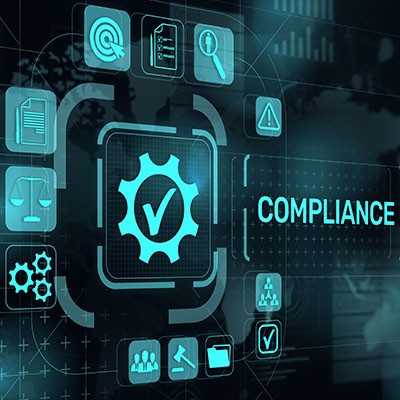Every business’ clients trust that they’re taking every measure possible to protect data, like personal information or financial records. However, with the number of businesses using electronic records continuing to climb, along with the rise of cybercrime, many industries have begun to impose regulations and compliances that are designed to keep personal information secure. Health and finance are two of the most heavily regulated industries, with the government having stepped in and set a specific standard of data security regulations that these companies must comply with.
To help make sure that your company is in compliance, Grove Networks can be there to help you to be compliant with the regulations your business operates under. Compliances and regulations usually fall into one of two categories:
- Government Mandated Compliances - Depending on the industry being regulated, the state government, federal government, and in some instances both, have the ability to pass laws requiring establishments to meet certain technology requirements and standards. Government mandates are usually focused on network and data security—and will audit a business to make sure that they’re in compliance and stay that way.
- Internally Mandated Compliances - More and more businesses that aren’t technically required to meet regulations by law are setting their own technology standards. IT policies, best practices, processes, and procedures are just a few items that may be part of internally mandated compliances. These types include:
- Bring Your Own Device (BYOD) or Mobile Device Management policies to control which devices can access your network.
- Employees that are looking to access a company’s network remotely must do so using a secure, virtual private network or VPN.
Business Continuity/Disaster Recovery
The majority of government compliances are going to require some type of business continuity planning. Managed Services Providers are in a position to help with business continuity in a few different ways. First, is with a data backup and disaster recovery. Ideally, every plan should have a BDR solution. Another function of an MSP is keeping a detailed inventory of hardware, software, and user access which comes in handy in the event that the building or workstations are damaged.
Monitored and Managed Infrastructure
When it comes to security measures, remote monitoring and maintenance of a network is a requirement for most regulations. Even when business hours are technically 8 a.m. to 4 p.m. or something similar, servers and networks are often powered on 24 hours a day. Government mandates require that your network and data are operational whenever technology is. MSPs not only provide monitoring and maintenance services, they can also provide you with the data proving your network was protected during an audit.
Vulnerability Assessment using Penetration Testing
To determine how secure a network is, many regulations require that regular penetration tests be performed. This common tool is an intentional attack on a company’s network by a friendly entity. Additionally, vulnerability assessments are often required, as well. This assessment is a report that indicates where potential weak spots in your network can be found. In the event of an audit, we can also provide the necessary documentation to prove these measures are being taken.
Depending on the requirements of your industry, there are many other ways that we can help with technology compliances and regulations. Whether government or internally mandated, contact the IT experts at Grove Networks today to help you get and stay compliant.

